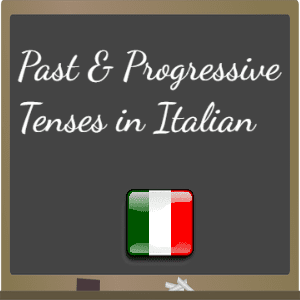In this lesson, we cover the past and conditional progressive tenses in Italian. The past and conditional progressive tenses in Italian are similar in their usage to their English counterparts.
Past Progressive Tense in Italian
The past progressive tense, similar to its use in English, describes an event that continued to take place in the past, e.g., “Io stavo parlando” (I was speaking). It is formed by adding the imperfect tense of the auxiliary verb “stare” to the present participle, also known as the gerund.
| subject pronoun + imperfect tense of the verb “stare” + gerund |
| -are ending e.g., parlare | -ere ending e.g., vendere | -ire ending e.g., finire | ||
| io | stavo | parlando | vendendo | finendo |
| tu | stavi | |||
| lui/lei | stava | |||
| noi | stavamo | |||
| voi | stavate | |||
| loro | stavano |
For example:
| Mia madre stava cucinando quando mio padre è entrato in casa. | My mom was cooking when my dad entered the house. |
| Stavamo nuotando mentre tu studiavi. | We were swimming while you were studying. |
Remember that the imperfect indicative tense can also correspond to the past progressive tense in English when describing continuous actions in the past. For example, “I was cooking” can be translated to either “Cucinavo” or “Stavo cucinando.” The past progressive tense may be interpreted as giving more focus on the action than the imperfect. However, in most contexts, both are valid options to express continuous actions in the past.
Conditional Progressive Tense in Italian
The conditional progressive tense is used to describe an event that would be happening now had another event happened earlier, e.g., “Io starei giocando se non fossi infortunato” (I would be playing if I weren’t injured). It is constructed from the conditional form of the auxiliary verb “stare” followed by the gerund.
| subject pronoun + conditional form of the verb “stare” + gerund |
| -are ending e.g., parlare | -ere ending e.g., vendere | -ire ending e.g., finire | ||
| io | starei | parlando | vendendo | finendo |
| tu | staresti | |||
| lui/lei | starebbe | |||
| noi | staremmo | |||
| voi | stareste | |||
| loro | starebbero |
For example:
| Starei parlando con mio fratello se fossi andato a casa sua. | I would be talking to my brother had I gone to his house. |
| Non starei mangiando molto se fossi a dieta. | I wouldn’t be eating much if I were on a diet. |
Other lessons in Level V:











